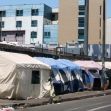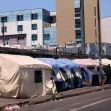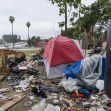Beleaguered by a Republican-stoked recall campaign, the Democratic Governor of California Gavin Newsom is accelerating his fight against the state’s homeless crisis, a key election issue and the one on which many believe he is most vulnerable.
The Governor announced a $12 billion investment package on July 12, which his office described as “the largest in state history.” The plan “to tackle homelessness” is part of the $100 billion “California Comeback Plan,” which includes $10.3 billion for affordable housing and $12 billion to help thousands get off the streets.
Newsom’s plan includes $2 billion in grants through the Homeless Housing Assistance Program (HHAP), designed to help counties, cities or other local entities partner in his efforts. The package also features $5.8 billion to add 42,000 new housing units through Homekey, a “national model for homeless housing,” which, according to its website, “provides grants for agencies to acquire hotels, motels, apartments and other buildings and convert them to interim or permanent, long term-housing.” Newsom’s comments also stressed the need for “a massive level” of federal assistance.
The new funds are in addition to the $13 billion that has already been spent on the problem since Newsom took office in 2018.
An additional $3 billion in new funds will be designated to assist those with serious mental and physical needs. In an August 10 interview with the Los Angeles Times, the Governor made it clear that “California needs to develop humane processes for moving people and clearing camps while also creating more housing options.”
In summary, Newsom’s new plan, which stresses “No results, no funding” contains:
- $7.5 billion to acquire and rehab housing through Homekey;
- 7,000 new units of affordable housing;
- $565 million to “stabilize homeless families;”
- $3.9 for “service-enhanced mental health housing, intensive behavioral housing” for people in need of these services or conservatorship and services for homeless veterans;
- $2.2 billion for clean streets, local aid, encampment resolution and “data and accountability systems to track progress and provide transparency.”
Since announcing the plan, Newsom has been traveling across the state to help clean up encampment sites while stressing their risk to health and safety. For example, he was in Berkeley on August 10, where he helped clean up tents near the freeway and announced a partnership with Caltrans to beautify freeways, update landscaping and provide better security.
Many studies have linked homelessness to mental and physical conditions. Ali Sutton, California’s deputy secretary for homelessness at the California Homeless Coordinating and Financing Council, reported that of the more than 248,000 homeless people who used her agency’s services, 41% said they had “disabling conditions.” Janey Rountree, executive director of the California Policy Lab at UCLA reported that one-fifth of the homeless population in Los Angeles had “clinically diagnosed serious mental illness.”
While announcing the new package, Newsom said, “I don’t think homelessness can be solved – I know homelessness can be solved…With record investments tied to strong accountability (from local governments) and efficiency measures, California will continue to build on the groundbreaking success of Homekey, changing the lives of tens of thousands of Californians for the better.“ His reference to accountability could be tied to a recent report from the state auditor that sharply criticized the “lack of coordination and accountability across the complicated web of state agencies and local, counties, cities and service reporters.”
Alleviating the homeless crisis was one of the key issues in his successful 2018 gubernatorial campaign, yet the number of people on the streets, in tent encampments, in parks, on beaches and in many other vacant spaces, accelerated nearly 25% since he took office—and that was before COVID-19.
Add this figure to findings from a May 11 poll from the Institute of Governmental Studies at UC Berkeley that found 57% of California voters rate Newsom as doing a poor or very poor job handling homelessness. Many businesses and residents are upset about the many adverse effects of homeless tents on their environment. And cities and neighborhoods do not want affordable housing units built in their upscale communities.
A bevy of GOP candidates is taking advantage of these polling results and neighborhood protests in opposition to Newsom’s efforts to defeat homelessness and clean up the streets. Businessman Jon Cox is traveling throughout the state with an eight-foot “ball of garbage” to symbolize the “trash that’s left behind,” due to Newsom’s failed policies. Candidate Caitlynn Jenner of “Keeping Up with the Kardashians” fame told Fox News anchor Sean Hannity that one of her neighbors moved to Arizona because he could no longer look at homeless people.
But it is not only Republican candidates and Jenner’s friends who have a problem with homeless Californians. On August 10, for example, a city council policy analysis report for Los Angeles City Councilman Mike Bonin found that he “should not pursue plans for overnight camping or other homeless facilities” in popular areas of his upscale Los Angeles district, which includes Will Rogers State Park and several westside beaches.
The September 14 recall election features a two-part ballot. First, voters must answer yes or no to the question, “Shall GAVIN NEWSOM be recalled (removed) from the office of Governor?” The next question instructs them to “vote for one” candidate to succeed GAVIN NEWSOM if he is recalled. Forty-six names, 24 of whom are Republicans, and a space for write-in candidates follow.
California housing is expensive. It is the most expensive state for renters according to the National Low Income Housing Coalition, which found that wages of $39 per hour are required to pay most rent, while the state’s minimum wage is $15, and most renters make less than $25 per hour. One million more units are needed for California’s lowest earners.
These are daunting challenges that will continue to challenge Newsom. Or his replacement.






